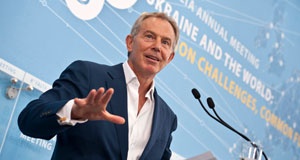

"For years, it was assumed, certainly in the West, that, as society developed, religion would wither away," said Tony Blair in a 2 January 2012 blogpost "Faith in a Globalized Age," published on New Europe Online. But it hasn't," said the former British Prime Minister," and, at the start of a new decade, it is time to take religion seriously." To that end Blair has created a Faith Foundation, "to create greater understanding between the faiths."
In a companion post, "Taking Faith Seriously," published the same day, Blair noted "the influence of religion and faith in determining the outcome" of the "Arab Spring." In short, said Blair, "religion matters. . . . Democracy is not just about the free elections and the constitutional rule of the majority. It is about freedom of expression, freedom of religion, and markets that, albeit regulated, also are free and predictable. In other words, democracy is not just a system of voting, but an open-minded attitude. ... I believe that the future belongs to the open-minded," an attitude that should prevail among differing religions. "What is needed are platforms of understanding, respect, and outreach in support of the open-minded view of faith."
In an interview with CNN posted on 11 November 2011, Blair offered his "10 dos and don'ts for religion and democracy." Following are excerpts from a speech delivered by Mr. Blair delivered at the seminar "Religion in the public sphere: secularism or laïcité?" in Milan the day before. Read the entire speech on the website Tony Blair Faith Foundation.
"There will be no peace in our world without an understanding of the place of religion within it. This is disconcerting for political and religious leaders. The politicians feel uncomfortable in debating religion [remember ‘We don’t do God’!]– it is off our beaten track of financial crisis, security challenges, healthcare, education, welfare. It pitches us into an unfamiliar realm where we suspect, rightly, many nasty swamps of controversy are located. Religious leaders often have political views and often express them strongly; but they so as people of faith driven to talk politics; not usually as participants in a debate about faith itself.
"However, the past decade has seen many convenient myths which disguised the importance of religion, stripped away. For many Europeans brought up in the 1960s and 1970s there was a single equation: as society progressed, religion would decline. It hasn’t happened. The global numbers of those espousing a faith has increased and what’s more has increased even in many nations enjoying strong prospects of development. The doubling of the population of the Arab world predicted over the next 25-30 years alone will mean a substantial rise in the numbers of Muslims. But actually high birth rates in countries such as Indonesia (now twice the rate of Italy) and with a population three times that of Germany will add to these numbers substantially. Latin America is seeing a big boost to evangelical Christianity. And every year here in Italy millions will gather to see and hear the Holy Father, who continues to draw crowds the world over (including in the UK) that dwarf those of any politician.
******
"So the time has come to put away the delusions: that faith is diminishing; that religion is not really what it’s about; that a debate about politics can be seriously conducted in the 21st Century without debating religion. And debating religion not as social science, foreign affairs or even psychology, but as religion.
"For this to happen, religious and secular, religious and political people need to start talking with each other. For, as globalisation pushes the world together-online, through the internet, in person through migration-the necessity of finding ways for people of different faiths to co-exist peacefully becomes urgent.
******
"That is the reason I began my Foundation. Without inter-faith understanding, the exclusivist and closed-minded attitude is allowed free occupation of the religious space in politics. But this is where I and others like me in politics, need help. It is where religious leaders must step forward and engage.
"This whole area to do with faith and its effect on the world’s geo-politics has to be taken to an entirely different, bigger and sharper level of inquiry and debate. It has to be overt, clear and out in the public domain visible to the people. It must be present in our universities, in our schools, where education about others is so crucial and in the arena of political exchange. In that arena we need to treat religion as religion not as a sub set of politics.
"Finally, were this to happen, there would, in my view be one major and positive consequence for faith itself. It would allow those of us of faith whether as in my case the Christian faith or in the case of others, their different faiths, to discuss and proclaim what our faith means to us, why Faith and Reason go hand in hand and how we feel Faith enriches our lives and guides them, however sinful we are. It would open up the potential of Faith to many who at present search for spiritual meaning but have come to regard the practice of Faith as the preserve of the irrational, the superstitious and the prejudiced. It would allow a true and rational belief in God to direct the path of the 21st Century. That is where Faith belongs. And why the world needs it."
